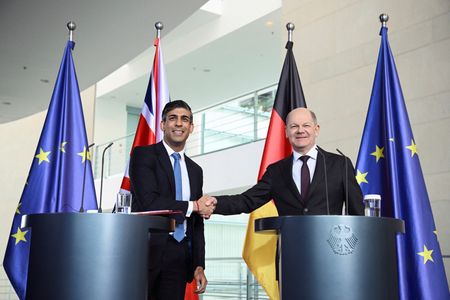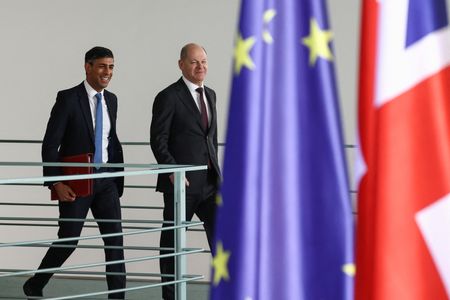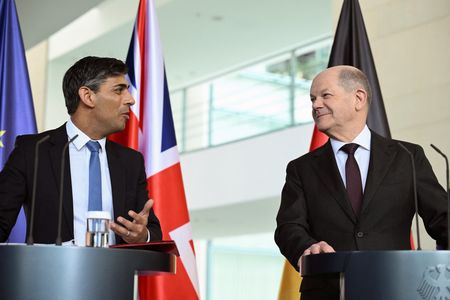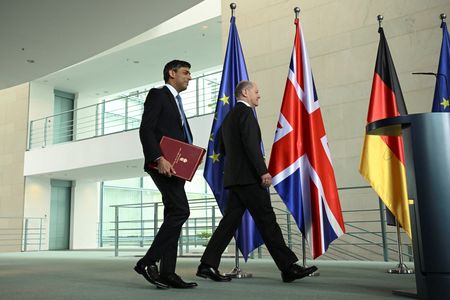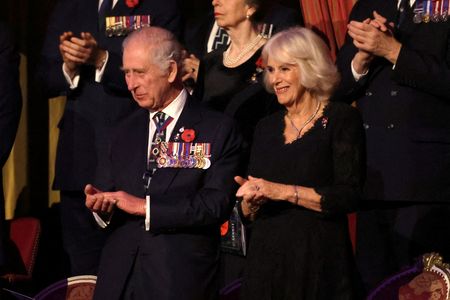By Elizabeth Piper and Andreas Rinke
BERLIN (Reuters) -British Prime Minister Rishi Sunak and German Chancellor Olaf Scholz agreed to closer defence cooperation on Wednesday, with both leaders saying Europe must unite to support Ukraine against Russia for as long as it takes.
The British leader hailed closer ties with Germany a day after announcing he would raise defence spending to 2.5% of GDP a year by 2030 in what he said was a challenge to other European countries to follow suit.
The two announced plans to develop Remote-Controlled Howitzer 155mm Wheeled Artillery Systems (RCH 155) and discuss collaboration on energy projects, including German energy investment, according to the British government.
“We’ve committed to delivering a new framework for our cooperation on defence, and we’re delivering an immediate expansion of our industrial cooperation,” Sunak told a news conference standing alongside Scholz.
“And together, we will continue to provide unwavering support for our Ukrainian friends, as you said for as long as it takes.”
After being welcomed by a military orchestra playing both countries’ national anthems dampened by shouts of “free Palestine” from a handful of protesters, both leaders were keen to underline their long-term support for Ukraine.
But asked about Germany rejecting a call to deliver Taurus cruise missiles to Kyiv, Scholz defended his decision, saying no other country had delivered as many arms defence systems as Germany, but on Taurus, his mind would not change.
“Perhaps I can express the hope that other countries which have Patriot systems will take another look at whether they can spare one (for Ukraine) amid all the other security challenges,” he said.
Germany has spearheaded calls for members of the NATO military alliance and beyond to step up on deliveries of air defence systems, which President Volodymyr Zelenskiy says are desperately needed to protect Ukraine from Russian bombardments.
Germany said earlier this month it would supply a U.S.-made Patriot air defence system and air defence missiles to Ukraine to help them ward off increasing Russian attacks on energy infrastructure.
FIRST MEETING AS PM
The meeting in Berlin was the first time Sunak had visited Germany since he became prime minister in October 2022.
The British leader has cut back his international travel, handing much of Britain’s diplomacy to his foreign minister, the former prime minister David Cameron, while he focuses on domestic policy ahead of an election this year.
But he used his return to the international scene to announce a large increase in defence spending, saying the British arms industry must be on a “war footing” when the world is at its most dangerous since the Cold War.
On its financing which some economists have questioned, Sunak said it was fully funded and the money would come from a reduction in civil servants, or public officials, and by using some funds earmarked for research and development.
“All governing is about prioritising and I’ve decided to prioritise defence because I think that’s the right thing to do for our country,” Sunak said.
Britain’s opposition Labour Party, which looks likely to win this year’s election, said it would examine the detail of Sunak’s announcement to see if it added up.
“Labour will conduct a strategic defence and security review in the first year in government to get to grips with the threats we face, the state of our Armed Forces, and the resources required,” said Labour’s defence policy chief, John Healey.
(Editing by Mark Heinrich and Christina Fincher)

